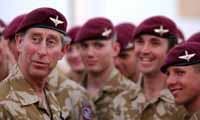800 British troops to leave Iraq
The government yesterday announced the withdrawal of 800 British troops from Iraq - one in 10 of the troops deployed there - but said the move did not signal the start of a complete pullout.

John Reid, the defence secretary, told the Commons: "Let me stress that the reductions I have announced are not part of a hand over of security responsibility." He added: "They are not caused by, nor a cause of, changes in troop levels of other coalition allies."
Mr Reid said that Britain would "stay [in Iraq] as long as we are needed, and wanted, and until the job is done".
But he also announced that over the next few weeks, a "joint committee to transfer security responsibility" - made up of Iraqi ministers, and officials from the US, Britain and other countries with troops in the country - will begin assessing whether conditions have been met to hand over security of at least some provinces to the Iraqis.
The Bush administration is under pressure to announce significant cuts in the 130,000-strong American military presence in Iraq in time for the mid-term congressional elections. Italy and Japan have said they will pull out troops this year. The British government is also under pressure to cut its forces in Iraq. But it is anxious to avoid suggestions that troop reductions are in response to violence in the country, which shows no sign of diminishing, and it cannot credibly claim cuts are a response to an improving security situation.
Mr Reid said the number of British troops could be reduced from 8,000 to 7,200 because more Iraqi forces were being trained and one of the tasks of British troops was to train them.
He said there were now 235,000 members of the Iraqi security forces compared with 190,000 in October, and 5,000 were signing up every month. Some 115,000 of these were in the Iraqi national army, which had more than 110 battalions out of a planned 118. Mr Reid described them as operational, combat battalions engaged in counter-insurgency operations. Of those, 59 were assessed as being "in the lead" or capable of independent operations, reports the Guardian.
I.L.
Subscribe to Pravda.Ru Telegram channel, Facebook, RSS!




